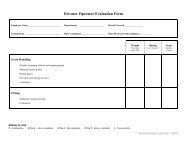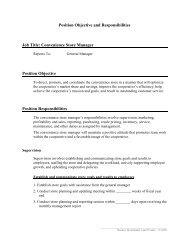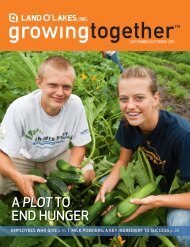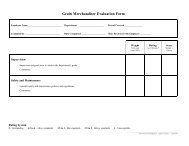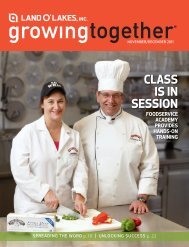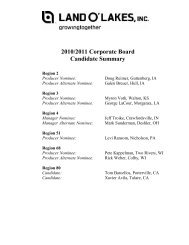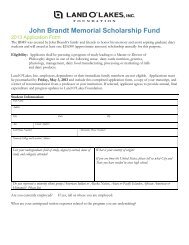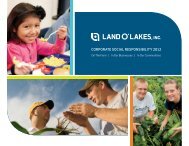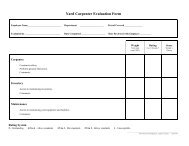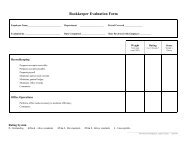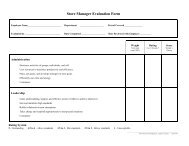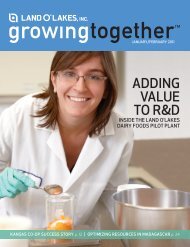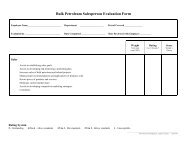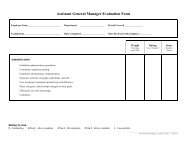2011 March/April Issue - Land O'Lakes Inc.
2011 March/April Issue - Land O'Lakes Inc.
2011 March/April Issue - Land O'Lakes Inc.
- No tags were found...
Create successful ePaper yourself
Turn your PDF publications into a flip-book with our unique Google optimized e-Paper software.
One of those messages is that in theU.S. and other countries, consumers are“going green.” They care not only aboutwhat we produce, but how we produceit, and the impact agriculture has onthe environment.When it comes to environmental stewardshipand agricultural sustainability,America’s farmers have made tremendousprogress. In the dairy industry, forexample, producers are using far lessland and water resources, and are producingless waste, for each gallon of milkproduced. And we’ve seen this kind ofprogress across agriculture. A remarkableexample is the 650 percent increasein corn production since 1930, whileutilizing 13 percent less land. That’sauthentic sustainability!Animal care is another issue that hasthe public’s attention. We know the vastmajority of producers are committed tohigh-quality animal care. But this is anemotional issue, and one publicized incidentof an animal being mistreated cancast doubt on an entire industry.As responsible operators, we need todo more to promote high standards andassure the public. That’s why FarmersAssuring Responsible Management(FARM) in the dairy industry, and otherefforts like it, are so important. Theydemonstrate our commitment to animalwell-being and protect the reputation ofmembers and <strong>Land</strong> O’Lakes. Our goal isto have FARM implemented throughoutour system by year-end 2012. That’s anachievable objective, and an essential one.Food quality and safety are also areas ofconcern for consumers.Although organic food makes up a smallpart of the overall market, as consumerslook for nutritious, high-quality products,More than 50 studies wereexamined, and they showedlittle or no difference in thenutritional value of foodsproduced organically andconventionally.there seems to be a prevailing view that organicallygrown food is “better” than conventionalor biotech production.To bring some clarity to this issue,<strong>Land</strong> O’Lakes had a leading consultingfirm review the research on the nutritionalcontent of organic and conventionally producedfood. More than 50 studies were examined,and they showed little or no differencein the nutritional value of foodsproduced organically and conventionally.Regarding food safety, America has thesafest food system in the world. Yet someconsumers have a different view. In today’shighly connected world – with instantcommunication and 24-hour newscycles – when a quality problem does occur,news travels fast.As an industry and as individual organizations,we all must adhere to robustsafety and quality policies and processesthat not only identify potential issues,but also prevent problems from happening.At <strong>Land</strong> O’Lakes, we have a company-wideProduct Safety and QualityPolicy, and continue to enhance the expertiseand resources devoted to safetyand quality assurance.Co-existence and choice<strong>Land</strong> O’Lakes members operate in agrowing industry that is at a pivotal pointas we consider what agriculture and foodproduction should become.Too often, the focus is not on how wecan feed a hungry world, but on how wedefine “good” agriculture versus “bad”agriculture, or “good” food versus“bad” food. We seem to be taking sides– it’s either large, technology-drivenfarms versus smaller farms driven byniche production practices … or organicversus conventional.We need to change the direction ofthe discussion, and make the case thatthere’s not good food or bad food basedon production techniques – there’s justfood. Very simply, the best solution to thechallenges we face is a food productionsystem built on the principles of co-existenceand choice.There is a compelling need for largefarms and advanced technologies andmanagement practices. These operationsare capable of producing the large quantitiesof safe, economical food necessaryto feed a growing global population. At thesame time, there also is an important rolefor smaller farming operations with sustainablebusiness models. They help keeprural communities vibrant and ensure customerand consumer choice.As we look to the future, our objectiveis to ensure that producers can choosethe production model that meets theirneeds, while giving consumers choices inthe products they buy. As we work to feedmore people, this commitment to co-existenceand choice is good for producersand good for the public we serve. ■Chris is the president and CEO of<strong>Land</strong> O’Lakes, <strong>Inc</strong>. He has 30 years ofexperience in the food industry and hasbeen with the cooperative since 1997.He has been president since 2005.Chris is based in Arden Hills, Minn.www.landolakesinc.com MARCH/APRIL <strong>2011</strong> 5



